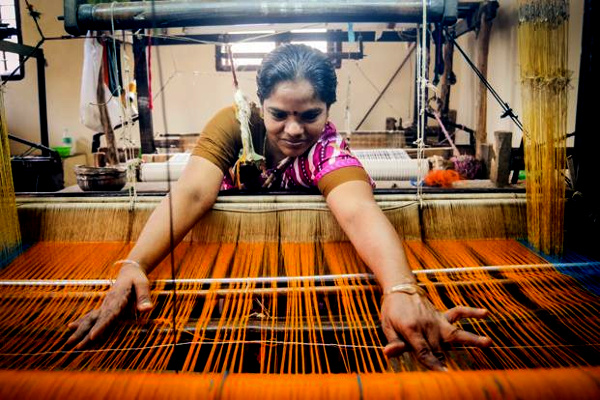When everything is going the organic way why should the six to nine-yard saris be left behind? I have often heard of the versatility of the banana plant whose each part can be put to use. And proving this right are the weavers of Anakaputhur who weave beautiful saris out of banana fibre.
Anakaputhur is a suburb of Chennai that lies a little beyond the international airport on the banks of the Adyar. Around 15-years-ago, a group of third-generation weavers of this village decided to stray away from a tradition of almost 9 decades
“Today we are a cluster of 100 weavers and the majority of the weavers are women. In the 1970’s we had a thriving business. It was the time that we were producing real Madras checked fabrics which we exported to Nigeria,” says C Sekar.
The change in political climate in Africa led to a ban on the imports which spelled huge losses for the Anakaputhur weavers.
He reminisces about his early years as a weaver, and says, “There was a time when there were 5,000 handlooms right in this village. Each household had at least five looms and today, finding even one loom for every 5 households, would be a big deal.”
Not wanting to give up on their tradition, the vast knowledge and expertise that each weaver brought to the loom, Sekhar tried to find ways to help handlooms make a comeback.
Speaking of how he thought of using banana fibers to make saris, he says, “I remember reading a version of the Ramayana in a Tamil magazine of Sita’s abduction and her need for a change of clothes. She did not want to ask her abductor (Ravana) for anything and pleaded with Hanuman to get her vaazhai naaru (banana fibre) and wove a sari out of it. This, I remember, left me with so many questions and as a weaver, I was extremely intrigued.”
“I remember thinking that if it could be done at a time when technology was no where close to what it is today then I should be able to find a way to do this now,” he says.
Sekhar has successfully given a dying industry a much-needed impetus. “We create yarn from banana fibres, extracted from banana stems. In the South of India, this is available in abundance. Over the years we have sold hundreds of these saris,” he says with pride.
Sekhar further shares that on an average, it takes two weavers two days to complete a sari and about 4 to 5 days for one weaver.
While the banana stems are available in plenty, the manual extraction of fibres from the stems is labour-intensive and time consuming.
The process involved
Explaining how this process is carried out, Sekhar says, “The stem of the raw material (banana or pineapple) is dried and scraped to remove dust. Then, each strand of the fiber is taken out manually to make yarn.”
Given the riot of colours the saris come in, there is also the need of using natural dyes. Dyes are extracted from various natural products like turmeric and indigo.
He informs that the product is treated in various herbs, spices and even cow-dung for their antibacterial properties which is good for the skin.
“We also use medicinal herbs like Tulsi and mint to ensure that skin allergies of all kinds are at bay,” says Sekhar.
“I developed 25 types of natural fibres and even made it into the Limca Book of Records in 2011, for weaving a sari using these 25 different fibres,” he says.
A sari costs anywhere between Rs 1800 to Rs 7000 and Sekhar says that many of the saris woven at this village have also travelled abroad.
Way forward
Sekhar has worked very hard to bring the weavers and their prowess into the limelight. His dream is to see retail stores of his products all over the world. But to begin with, he wishes to be able to open a retail store in Chennai.
Through his conversation with The Better India, he wants to urge people to buy their products, and requests the government to give these handloom weavers the recognition and help they deserve.
He says, “We are not asking for crores of money. But, do come and see our products. And support us to be able to do better and truly take the ‘Make in India’ tag global.”
With customers.
Interested in sustainable clothing? Then do look up their website or contact C Sekhar directly at +91-9841541883 for any further queries you may have.
Source: TBI
Image Courtesy: Live Mint
You may also like
-
Trade Connect E-platform For Exports Is Single Window, Fast, Accessible And Transformational: Shri Piyush Goyal
-
Dot Simplifies Approval Processes For Telecom Licenses And Wireless Equipment
-
Coal Production and Supply Trends on Positive Trajectory
-
Union Minister To Release Booklets On Promotion Of Indigenous Species & Conservation Of States Fishes
-
2nd India-Japan Finance Dialogue held in Tokyo on 6th September, 2024
